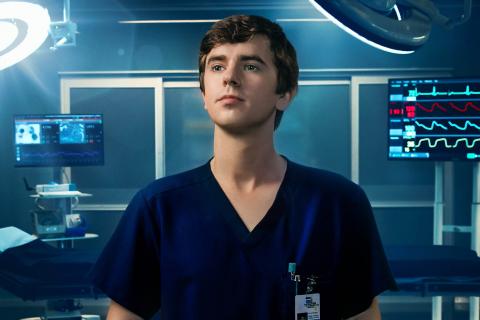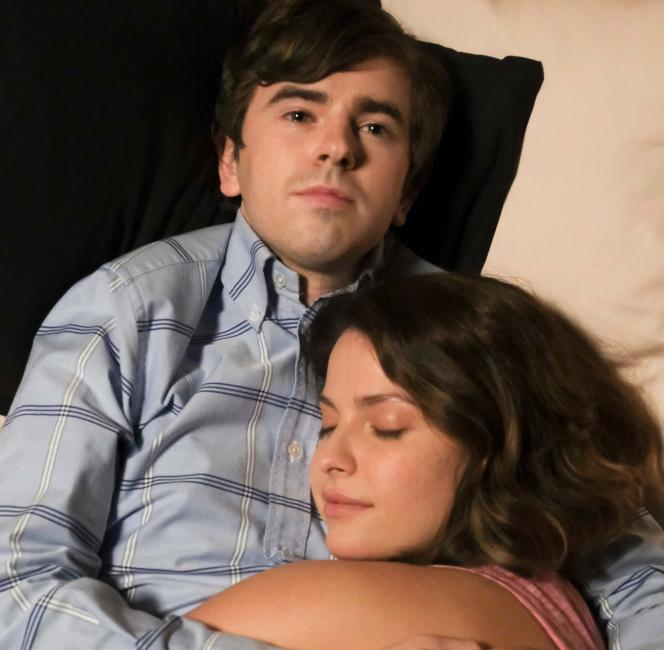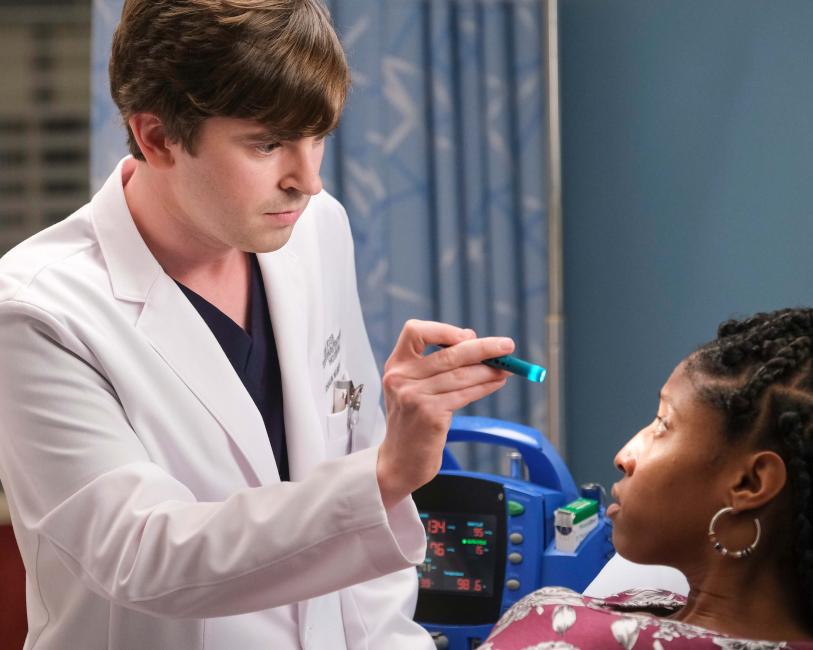
~ 7 minute read
The Good Doctor, which airs on CTV, has drawn much attention from the autism community. It centres around Dr. Shawn Murphy, a young autistic savant resident surgeon at an American hospital, played by neurotypical actor Freddie Highmore. Highmore has drawn praise from some parts of the autism community for the care he has brought to the role. However, others have raised concerns over the representation of people on the autism spectrum in the media and the overall message that a program like this presents to the public.
Autism Ontario assembled a diverse group of adults with autism to review and discuss The Good Doctor. The group consisted of self-advocates Michael McCreary, comedian and author; Courtney Weaver, freelance writer; David Moloney, Autism Ontario Board Member and Mutual Fund Indexer with CIBC; Matthew Lemay, freelance writer; Anthony Spezzano, Capital Markets Specialist, TD Securities; Christian Maltesta; and, Nicole Corrado. Michael Cnudde, self-advocate and Specialist Communications and Project Development, Autism Ontario, moderated the panel.
“All in all, I find that it plays the autism card a little too heavily,” said David. He found the show’s lead actor and writers tried to show autism as a “broad concept or a construct.” He thought this was too general an approach and much was lost this way. “It doesn’t really portray the positivity exuded by people on the spectrum.”
“I actually quite like his performance, but I am a bit biased because I like the actor a lot,” said Nicole. She thought Highmore’s performance was good but added, “I do think it is a composite of his previous characters... He has played all sorts of neurodivergent and neurotypical characters.”
Michael McCreary reflected on his own experience working in the entertainment industry. “I was working with a neurotypical guy who was playing a neurodivergent guy a few years ago on a TV procedural, and I can see how actors and those consulting can be in a tough spot,” he said. He acknowledged that jumping into a role like Dr. Shawn Murphy isn’t easy, but he still wasn’t huge on the performance; “... but that is a grievance that I have with the performance of autism itself.”
Christian observed that “Freddie Highmore … does a good job with the character, but we need people on the spectrum to play people on the spectrum. I want to see more autistic people play autistic roles.” He noted that there was some backlash when Taron Egerton, a straight man, played Elton John in the movie Rocket Man.
“There needs to be more care with different focuses and areas of savant syndrome.”
“I think they captured his exceptionalities well,” said Anthony, who has an educational background in cognitive science. He commented on the depiction of the show’s main character as an autistic savant, noting the risk of generalizing characters with autism in entertainment media. “It’s dangerous to over-dramatize this,” he said, citing an episode of the TV series Criminal Minds that featured a child with savant syndrome. “Viewers and/or people who have little understanding or awareness … assume that what they are seeing is the rule for everyone with savant syndrome, for instance.”
Matthew acknowledged that the series makes interesting choices in portraying Shaun Murphy as a savant. In the pilot episode, “he tries to figure out what is going on with a boy, and it visually shows the way his mind works. This is done well in the series.” However, Matthew agrees with other reviewers that more care is needed in the way that savant syndrome and autism are represented in film and television. “There needs to be more care with different focuses and areas of savant syndrome,” he said.
The discussion turned from the series in general to the episode “Parenting,” where Dr. Murphy met his girlfriend’s parents for the first time and complications ensue. “It was an incredible episode that really showed that Shaun was able to prove his girlfriend’s parents wrong about being in a ‘challenging’ relationship,” was Courtney’s summary of the episode.
Anthony found the events portrayed in the episode relatable. “It was shown here that people, despite their best efforts and self-awareness, may be ignorant or misinformed,” he said. “Whether it's my friend’s parents or in the professional workplace, the timing of disclosure has its complications when dealing with misinformed or ignorant people. If disclosure doesn’t happen early, it can create obstacles between you and growth in professional and personal spheres.”
There were parts of the episode Matthew found more relatable than others. “Rehearsing social situations like this did not ring true to me,” he said. “I could certainly see aspects of Shaun’s behavior as being familiar, but I haven’t ever rehearsed a social situation.” However, he liked Shaun’s speech to his girlfriend's parents, when he acknowledges that he is different than anyone she has dated previously and that they are working things through. ”I think that is representative of how we all want to be treated, how we all want to stand up for ourselves,” said Matthew.
David pointed out that Shaun “rose above the issues that the girlfriend had with her parents, and … found his [own] fit,” said David. “It’s how we should operate when we encounter family issues like this.”
Nicole liked how the character took the metaphor “pain in the butt” and turned it into a joke, comparing meeting his girlfriend’s parents to hemorrhoid surgery. “People on the spectrum can be funny and sarcastic,” she said.
“With Shaun just being himself,” said Courtney, “he was able to be calm, collected and patient with her parents. I could see his mannerisms in a friend of mine who’s on the spectrum. It was an incredible episode that really showed that Shaun was able to prove to his girlfriend’s parents wrong about being in a ‘challenging’ relationship.” She especially appreciated how he responded when the parents cited the long-debunked myth that vaccines cause autism. “He rises above it all just by being himself.”
Christian found Shaun’s relationship with his mentor, Dr. Glassman, very relatable — and important “I like that real attachment because with Glassman it is a two-way relationship. They both teach each other things.”
David didn’t relate, however. “I have a strong, supportive family, and this character has none. While there is a surrogate father for Dr. Murphy, that’s different from my experience.”
Finally, the discussion turned to the messages the show was sending, either on purpose or accidentally, regarding people on the autism spectrum. What might neurotypicals and people on the spectrum make of the show?
"We are close to having a complicated character; we are in the apology/role model phase, but we aren’t there yet.”
“It’s the role model thing, right?” said Michael McCreary. “We are placing a character with cultural baggage based on a diagnosis in a well-intentioned way. We are on the cusp of something potentially good.” Michael liked how the character of Dr. Murphy was played as a flawed human, rather than as a stereotyped “precious child.” He added, “I feel we are close on the autism front. We are close to being characters who are screw-ups up for any human reason, not DSM-5 reasons. We are close to having a complicated character; we are in the apology/role model phase, but we aren’t there yet.”
“I think,” said Nicole, “the message is that autistic people are versatile … that they are empathetic, complex." Although, she says, there are not a lot of PhDs or savants, The Good Doctor remains a positive depiction of an autistic person who does meaningful work, lives on their own and has a committed relationship. “It doesn’t infantilize autism as other media have.”
Matthew agrees with Michael McCreary and Nicole. “Overall, this is more positive depiction. I am happy we have it. I agree with Mike that we are on the cusp of where we need to go.”
“It’s a start. There’s a long way to go,” said Anthony. “COVID isn’t making this easy, but I am very hopeful. Maybe we just need to advertise ourselves for consult in the industry.”
“I think that this show has matured Shaun’s character from the pilot to the ‘Parenting’ episode,” said Courtney. Shaun’s relationship is a huge stride forward, she said. “I think that is a catalyst for more informed and holistic depictions of autism.”
Photos courtesy of CTV


